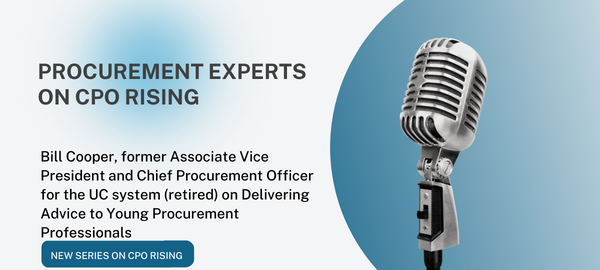Our “Procurement Experts on CPO Rising” series continues today with an excerpt from my 2021 episode of the Procurement Rising Podcast – Bill Cooper, former Associate Vice President and Chief Procurement Officer for the UC system, now retired (click to listen to the full interview). Note that this excerpt has been edited for readability.

Andrew Bartolini: When we first spoke nearly 20 years ago, you were just as passionate then as you are now about a career that’s spanned more than 50 years. As you reflect on that, what was it that drew you to procurement, and what kept you in the profession? What do you love about procurement?
Bill Cooper: It came from my initial trainee rotational assignment experience. And then throughout those stops along the way in the various functions, I saw that procurement seemed in the midst of things. Almost everybody had to come through procurement at some time or another. That is what I enjoyed the most. Procurement is such a central function and strategic function. When I came to UC and we started taking the 10 procurement organizations and melding them into one overall organization with 10 locations, we came up with a vision and mission statement. It was to make it clear that procurement was a strategic function and integral to the financial health of the university.
One of the greatest joys was when my CPO (the executive vice president of the University of California) made his annual budget presentations. When he speaks to large groups (the regions of the University of California and otherwise) his presentation includes a pie chart of both the cost of expenditures and the revenue. But also in that pie chart, procurement is clearly represented showing not just what we’re reducing in cost but also what we’re generating in revenue by more reactive types of contracts. We are clearly there as a strategic player in the financial health of the organization. And we have an unusual ability to be able to quantify the value of our contribution. I’ve enjoyed that, and it’s kept me driving because we can continue to quantify it in different ways and in greater forms.
AB: While you found procurement serendipitously, there are many young professionals who are seeking out procurement. What advice do you have for new procurement professionals that are getting started in their careers?
BC: They need a true understanding of what the capabilities of a true procurement professional can be, meaning always keeping their eyes on that connection to whatever their organizational mission is and how they are connected. When they’re making a decision on where to work, how does the organization view procurement? It can be as simple as looking at the titles. When I first came to UC, I immediately removed the word “buyers.” We’re not buyers. Buyers are the people who buy from the contracts that we put in place. We want to be procurement specialists and contracting officers. And we want to be seen as professionals.
You can see these things in an organization. Is the head of procurement referred to as the chief procurement officer? Does procurement have a seat at the table? If not, then it may be wise to rethink joining the organization. Be clear that you see procurement as a career path and does that match their view as well? Procurement is a career path with opportunities that lead all the way to CEO. There are a number of CEOs that came from the procurement field. This is only going to grow with the attention that’s come from the COVID-19 pandemic and how imperative the supply chain is to the enterprise. Don’t be surprised by the number of CEOs coming out of supply chain. Thus, look for organizations that will give you opportunities to grow.
My career has been about transformation. I’ve never enjoyed just staying and doing the same thing over and over. We should always be questioning how we can do it better and differently. And don’t overlook the importance of client relationship skills. I use the word “client” because “customer” is more transaction-based. You’re selling something and it’s instant action. Whereas a client requires you to know something about them. A client is more of a professional relationship where you know what their needs and issues are. And they look to you to represent their best interests. That’s imperative for true success.

